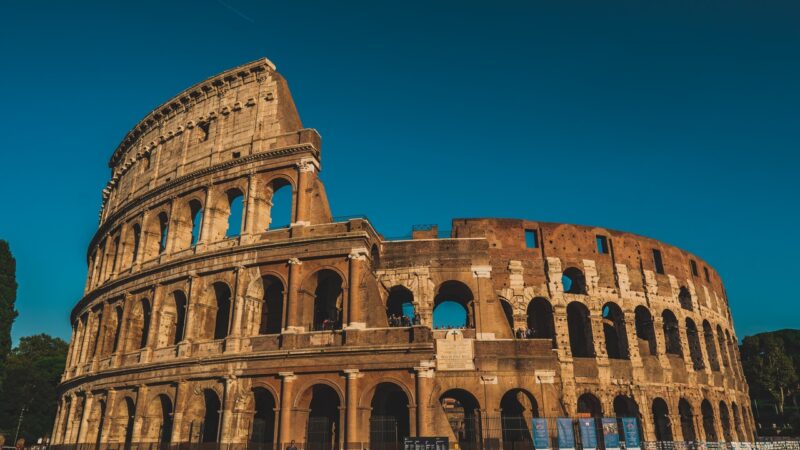Italians have long been known for their mastery of the language – and its reputation as a romantic one. While Italian is spoken in many countries across Europe, it is Italy itself that has become synonymous with this captivating tongue. But why? From its rich history to its unique culture, lets explore why the Italian language is considered so romantic.
1. Tracing the Origins of Italian Romance
Exploring the history and culture of Italy reveals the origins of Italian romance, a language that has become synonymous with love. Italian was a major form of communication in ancient Rome, used by citizens and visitors alike. Over time, it evolved into what is now known as Romance, a language that mixes Latin words with everyday speech to communicate more effectively.
Romance soon became popular among nobles who used it to express their thoughts more eloquently. The result was a richer dialect that oozed charm, which continues to this day. As Italy developed politically, Romance also adapted to suit different tastes, becoming softer or harsher depending on the situation at hand.
This variety allowed people to express themselves in ways they couldn’t before, often conveying deep emotions without explicitly saying them out loud. The cultural richness of Italy’s past also gave way to new forms of expression, such as operas, plays, and novels where characters spoke passionately about love in endlessly creative ways, making Italian truly romantic.
While literature from other countries has influenced Italy, Italian remains one of the most romantic languages around today due to its longevity and cultural significance. And if you want to say i love you in Italian, it’s “Ti amo.”
2. Exploring the Cultural Significance of the Italian Language in Love and Courtship

The cultural significance of Italian language in love and courtship is a fascinating topic that has been explored throughout the ages. From Dantes immortal lyrics of romance to modern-day expressions, it is easy to see why the Italian language carries such an aura of mystique and allure for those who speak it. This article will explore the history and culture behind this romantic phenomenon, delving into its origins and examining how it has evolved over time. Italian literature can be traced back centuries, with some of its earliest examples rooted in medieval courtly love poems.
These works often used figurative language as a tool to express emotions more deeply than words alone could ever convey. As time passed, this tradition continued with lyrical sonnets being written by poets like Petrarch and Dante, whose divinely inspired verses still evoke feelings of passion today.
Moving on through the Renaissance period saw the emergence of opera as a popular form of entertainment among high society circles in Italy – something which was heavily influenced by the passionate nature conveyed through literature at the time. Even now operas are still performed around Italy during festivals or special occasions; filled with stories about heartbreak and longing that have held audiences captivated for hundreds of years.
In addition to these literary forms, there are also countless everyday expressions used in Italian when referring to matters related to love or courtship – from terms describing physical attraction or admiration (e.g “bacteria” meaning ‘to kiss her’) right through to phrases expressing commitment between two people (like “ti amo” meaning I love you). Together they provide further testament to why Italian holds such an important place within romantic relationships across Europe today – even if someone doesn’t understand what theyre saying!
3. Examining How the Italian Language Evolved to Become a Symbol of Intimacy and Affection
The Italian language has long been associated with a particular type of romance, often referred to as “the language of love”. To explore why this is the case and how it came to be, it is necessary to examine its history and culture. When looking at the evolution of Italian from its former Latin roots, two factors are key in understanding how this language became so deeply entwined with feelings of intimacy and affection – its unique vocabulary and grammar. Italian’s rich vocabulary contains many words which express emotions such as love or passion more powerfully than those found in other languages.
This means that when speaking or writing in Italian, one can convey their feelings more effectively than if one were using another language. Moreover, Italians have developed an elaborate system for expressing nuances through word choice; for instance, one might say i amo (I love you) but also add “con tutto il mio cuore” (with all my heart) to emphasize their devotion even further. As a result of these features, speaking Italian can create a powerful emotional response between two people who share the same native tongue – something which cannot easily be replicated by any other language.
In addition to its extensive lexicon, certain aspects of Italian grammar also contribute to making expressions seem much more intimate or passionate than when spoken in other languages. For example, verbs may take different endings depending on whether they are being used with someone who is familiar or unfamiliar (such as tu vs lei), thus conveying familiarity that would otherwise not be present with simply saying you.
4. Investigating How Modern-Day Italians Utilize The Language as an Expression of Love and Devotion

Italian is a language of love and devotion, one that even modern-day Italians still use to express their feelings. Romance has been deeply woven into Italian culture for centuries, with its poetic syntax and sophisticated vocabulary making it an ideal tool for conveying emotion. By investigating how modern-day Italians utilize the language as an expression of love and devotion, we can gain insight into why Italian is often considered romantic. Modern Italian literature is full of examples of passionate romance expressed through beautiful words in both poetry and prose.
Whether its Dante Alighieri’s La Vita Nuova or Giovanni Boccaccio’s Decameron, many famous works feature intense emotions like admiration, longing, joy, and sorrow – all written using the power of the Italian language. Even today couples often write heartfelt letters to each other in perfect verse or take part in traditional serenades beneath balconies – another classic example of expressing deep affection via song lyrics composed with great care in what else but Italian!
Many expressions used by contemporary Italians also demonstrate this sentimentality; they are filled with caring expressions such as ‘ti voglio bene’ (I love you) or ‘mi fai impazzire damore (you drive me crazy with your love). Moreover, Italy boasts some unique terms that perfectly embody romanticism like appuntamento galante which translates literally as “gallant appointment: a phrase used to describe a date between two lovers who meet up secretly away from prying eyes! These types of phrases showcase just how much importance people give to being able to express themselves properly when looking for romance.
5. Uncovering Why People Around the World Find Italian to Be Such a Romantic Tongue
When it comes to the Italian language, it is known for its unique ability to evoke romance and emotion. Many people around the world find that speaking Italian can bring about a sense of passion and love. To understand why so many people are drawn to this beautiful language, one must explore its history, culture, and impact on modern-day society. The Italian language has been around since ancient times; traces of Latin can be found in almost all dialects today. Through centuries of evolution, there have been various changes in pronunciation and grammar that makeup what we know as modern-day Italian.
Interestingly enough, some words remain unchanged from their original form even after all these years! The historic roots of the language give it an undeniable charm that captivates millions of speakers worldwide. One factor which contributes heavily to Italy’s romantic reputation is its strong connection with art and literature throughout history. From Dante Alighieris Divine Comedy to Michelangelos Sistine Chapel ceiling frescoes; from renowned operas by Giuseppe Verdi to Renaissance masterpieces by Leonardo da Vinci – each piece serves as an example of how powerful words can be when combined with music or visuals.
This phenomenon continues into modern times too: popular films like ‘La Vita e Bella’ (Life Is Beautiful) showcase how Italians use their native tongue to create stories full of heartwarming moments or comedic scenes alike! Furthermore, food plays an equally important role in maintaining Italy’s romantic image!
Traditional dishes such as spaghetti carbonara or risotto alla Milanese are widely considered delicious examples of Italian cuisine across the globe – not only because they taste good but also because they represent a part of Italy’s culture that other nations appreciate deeply. Moreover, most recipes are passed down through generations via spoken word rather than written text – emphasizing once again just how influential verbal communication can be!


